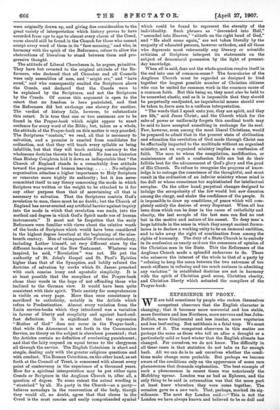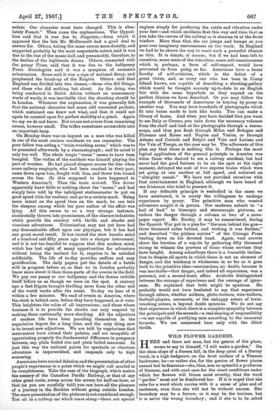EXPERIENCE BY PROXY.
'WE are told sometimes by people who reckon themselves competent observers that the English character is changing; that it becomes more mercurial and less stable, more Southern and less Northern, more nervous and less John- Bullish, more Continental and less insular, more vegetarian and less beef-eating. But antithesis is a fatal trap. We must beware of it. The competent observers in this matter are perhaps the same as those who tell us after a drought or a particularly mild or hard winter that the English climate has changed. For ourselves, we do not know. The difficulty in all these cases is that statistics do not take us far enough back. All we can do is to ask ourselves whether the condi- tions make change seem probable. But perhaps we become aware of the conditions only on the appearance of some rare phenomenon that demands explanation. The best example of such a Phenomenon in recent times was notoriously the Mufeking uproar. London,was as bad as Ephesus, and the only thing to be said in extenuation was that the more part at least knew wherefore they were come together. The occasion gave us a new verb. That, perhaps, marked its sig- nificance. The next day London said :—" This is not the London we have always known and believed to be ao dull and
sedate. Our character must have changed. This is abso- lutely French." Then came the explanations. The Opposi- tion said that it was due to Jingoism,—from which it appeared that the late Mr. McDermott had a good deal to answer for. Others, taking the same course more directly, and supported probably by the most respectable actors, said it was due to the rise of the music-hall, and presumably, therefore, to the decline of the legitimate drama. Others, connected with the penny Press, said that it was due to the halfpenny Press. Sociologists said it was a symptom of excessive urbanisation. Some said it was a sign of national decay, and prophesied the break-up of the Empire. Others said that England was divided into two alasses,—those who did things, and those who did nothing but shout. As the doing was being conducted in South Africa without an unnecessary waste of words, it was inevitable that the shouting should be in London. Whatever the explanation, it was generally felt that the national character had some odd concealed pockets, which contained one knew not what, and that it could not again be counted upon for perfect stolidity at a pinch. Again we say we do not know. But we are not averse from examining causes, however small. The trifles sometimes accumulate into an important heap.
On Monday there was an inquest on a man who was killed in one of the most curious accidents we can remember. The poor fellow was acting a "train-wrecking scene," which was to be presented afterwards by a cinematograph ; and he acted it only too well. The whole tragic "scene" seems to have been bungled. The victim of the accident was himself playing the part of wrecker. He had placed sleepers across the line when some railway employes, who had been coached in their part, came down upon him, fought with him, and threw him bound across the line. (Is this supposed to have happened in Western America?) Then the train arrived. The driver apparently knew little or nothing about the "scene," and had simply been told by the indulgent stationmaster to put on good speed (this for realism) and go to a certain mark. Being more intent on the speed than on the mark, he ran into the sleepers among which the poor author of the affair was lying. All this seems to us a very strange instance, accidentally thrown into prominence, of the obscure industries which provide the country with thrills and shocks and vicarious adventures. Urbanisation may not yet have had any demonstrable effect upon our physique, but it has had one great moral result. It has turned the slow bucolic mind of a hundred and fifty years ago into a sharper instrument, and it is not too fanciful to suppose that this modern mind, which has lost sight of many opportunities for adventure without losing the instinct for it, requires to be satisfied artificially. The life of to-day provides endless and easy gratification. The daily papers put the details of a battle still in progress before us, so that we in London probably know more about it than three-parts of the armies in the field. We pay our penny or our halfpenny and the drama unfolds itself before us as though we were on the spot. A century ago a fast frigate brought thrilling news from the other end of the world weeks after the event. To-day we hear of it within a few minutes. We read of events in America, where the clock is behind ours, before they have happened, as it were. This heightens the value of all impressions ; and those whose business it is to provide the shocks can only respond by making them continually more shocking. All the adjectives of modern life have been parading themselves in the superlative degree for a long time, and the only thing now is to invent new adjectives. We are told by vegetarians that meat-eaters have ruined their palates, and are incapable of appreciating properly the fundamental difference in pungency between, say, plain boiled rice and plain boiled macaroni. In just this way the national palate for spectacle or vicarious adventure is impoverished, and responds only to high seasoning.
Americans have carried delusion and the presentation of other people's experiences to a point which we might call morbid in its completeness. Take the case of the biograpb, which makes the scenery-of the Canadian Pacific Railway, or that-of any other great route, sweep across the screen for half-an-hour, so that (as you are carefully told) you can have all the pleasure of a journey in the Rockies without going outside London. The mere presentation of the pictures isnot considered enough. You sit in a railway car which roars along—there are special engines simply for producing the rattle and vibration under your feet—and which oscillates first this way and then that as you take the curves of the railway as it streams in at the front window. More than that, the car jumps and bumps as you pass over imaginary unevennesses on the track. In England we had to be shown the way to reach such a powerful illusion as this., It is simple, of course ; but if we had been left to ourselves, some sense of the ridiculous, some self-oonsciousness which is, perhaps, a form of self-respect, would have prevented us from going so far. Americans have a leaser faculty of self-criticism, which is the defect of a great virtue, and, as every one who has been in Coney Island knows, are capable of describing a shooting-gallery which would be thought scarcely up-to-date in an English fair with the same hyperbole as they expend on the perfect illusion we have described. Or you may follow the example of thousands of Americans in touring by proxy in another way. You may have hundreds of photographs which fit into boxes made to look like books. You can make a library of boxes. And when you have decided that you want to see Italy or Greece, you take down the necessary volumes from the shelf and look at the photographs through a stereo- scope, and thus you flash through Milan and Bologna and Florence and Rome and Naples and Venice, or through Athens and Corinth and Delphi and Volo and Larissa and the Vale of Tempe, as the case may be. The adherents of this plan say that there is nothing like it. Perhaps the most logical application of the general principle in America was when those who desired to see a railway accident, but had never had the good fortune to be on the spot at the right moment, defrayed the cost of two express trains which were set going at one another at full speed, and achieved an "almighty smash." We have not provided ourselves with that entertainment in England, although we have heard of one Irishman who tried to procure it.
If any definable principle is embodied in the cases we have mentioned, it is surely the willingness to undergo experience by proxy. The primitive man who wanted adventure sought it in person. Our moderns submit to "a hail of lead" in bioacopic and stereoscopic pictures, or endure the danger through a column or two of a news- paper report. Mr. Dooley, it may be remembered, daring the Spanish War put in a plea for "the man behind the gun— three thousand miles behind, and wishing it was further," and described "the pitiless extries " of the Chicago Press beating down on his devoted head. Again, vast crowds share the heroism of a cup-tie by gathering fifty thousand -strong to witness the prowess of those whose services they have bought. Among schoolboys there is a traceable inclina- tion to despise all sports in which there is not an element of danger, and the tendency is wholesome in so far as it goes back to the primitive idea—unconscious, no doubt, because it was inevitable—that danger, and indeed all experience, was a personal, not a second-hand, affair. Aristotle distinguished between the courage of experience and the courage of ignor- ance. He explained that both might be spurious. He probably would not have hesitated to say that experience through others, whether soldiers, globe-trotters, wire-walkers, football-players, aeronauts, or the unhappy actors of train- wrecking scenes, is beyond doubt spurious. We do not say that experience in which there is a complete sympathy between the principals and the seconds—a -real sharing of responsibility —is not capable of purifying men according to the immortal formula. We are concerned here only with the illicit thrills.



























































 Previous page
Previous page